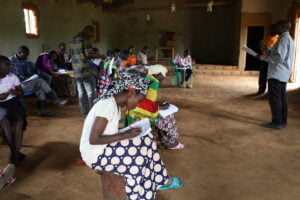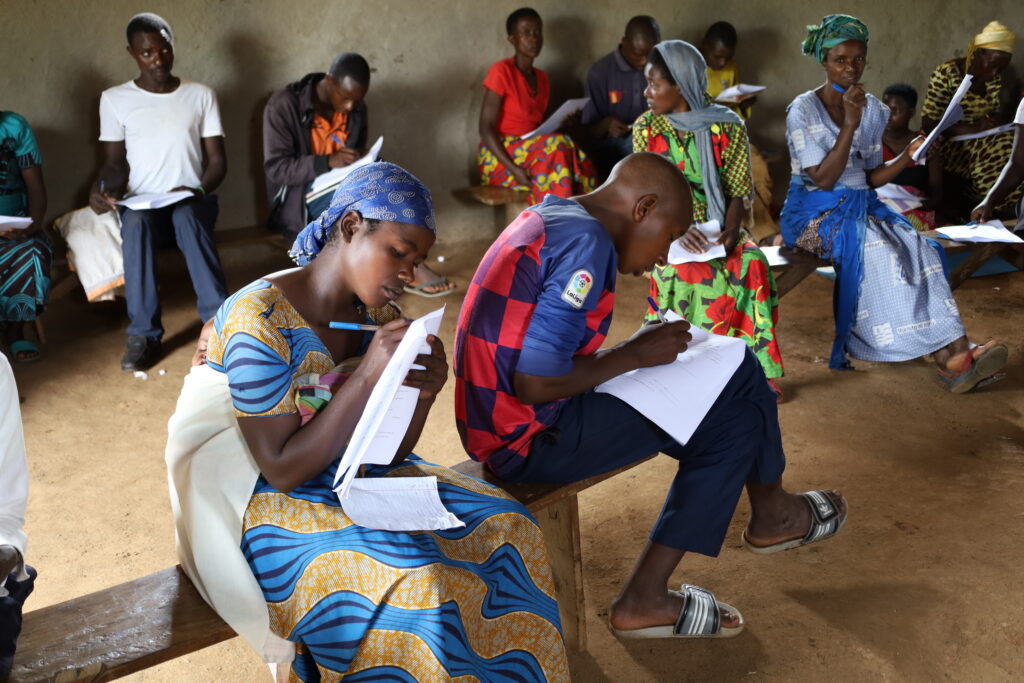For the last 27 years, Finnish Refugee Council (FRC) has been supporting refugees and host communities by providing them with basic adult literacy skills. Through the years, learners would go through an 11-month training period and at the end they would sit for an exam prepared by their instructor. Although this method of assessment worked well for the learners on one hand, on the other hand, it became increasingly hard to have an accurate evaluation of the learners. And help FRC improve the quality of teaching.
Therefore, in a bid to make the final assessment uniform across all settlements, it was necessary to set a standardized exam based on the already existing Functional Adult Literacy (FAL) curriculum with assistance from a training material development specialist. The exams were structured into two sections, A and B. Section A had dictation and writing questions while section B had comprehension questions.
On September 25th, 2023, FRC organized a standardized exam for all learners under the FAL program across all settlements where it is being implemented. The exams started at the same time and external people were used to supervise to reduce malpractice.
The exams received mixed feelings from both learners and instructors. While some were optimistic about them for instance one of the instructors noted that “According to me as an instructor, this is good because we have been setting simple exams for them but with the standardized exam the learners are forced to think and concentrate on what they are doing. I am happy with the exam”, says Kamugisha Paddy.
And others were worried about the performance of the learners.
Learners share their experience with the standardized exam
Agnes Furaha, a FAL learner who has lived as a refugee in Kyaka II, refugee settlement in Southwestern Uganda noted that “the exam was hard, but I tried to answer all questions that I could.”
While sharing about her prospects she went on to share about her plans after the exam noting that if she passed, she would like to enroll for the FAL advanced class and later join the English class.
She further stated that if the results come back, and if she has failed, she would be willing to repeat the class.
Babusinza Murabaho, also from Kyaka II, noted that “the exam has been difficult for me, because I missed 5 months of classes. At first my wife gave birth to triplets and needed help then after my son fell sick and was admitted in hospital for 3 months.” He says that “missing all those classes affected my progress, I am slow at reading and writing and also my handwriting is still poor”.
Although it was a rough start for Murabaho, he added that he was planning to repeat the class and hopefully pass the exam without difficulty.
Instructors share about the standardized exam and how it has been for them
While sharing about her experience, Jackie Ashaba, who has been an instructor with FRC for 3 years, noted that “As an instructor, I would have set the exam different.” She added that the learners are complaining that the exam is hard.
On a positive note, she said that the exam was good because it was set in the local language which makes it somewhat easier for the learners.

Manzabayo Cyprian, instructor who has been a Swahili instructor with FRC for 3 years now, had this to say, “when we used to set our own exams and share them with the adult education officers, they would change some words which would confuse the learners but at least with this exam, the learners easily understand the Swahili.”
According to Britannica, swahili has about 15 dialects and pidgins from Kenya, Tanzania and Congo. Some words used in the dialects are different which makes it hard for one to understand if a word is translated into another dialect.
He goes on to add that “the only problem we have seen is with numeracy. The learners were happy with the dictation part because they were saying these are new things”.
He further notes that “the learners were initially afraid of being supervised by different instructors and not the ones that they are used to, but when we explained to them that we are also instructors with other groups they were able to trust us and sit for the exam.”
On the other hand, Kamugisha Paddy, instructor from Nkasja A, in Kyaka refugee settlement in Southwestern Uganda noted that:
“This exam has been quite difficult, and it is different from others which we have been doing, because first the exams came in envelopes, and the learners feared because it’s as if they were sitting for UNEB (Uganda National Examination Board, is the body responsible for setting final exams for primary and secondary levels in Uganda). Then when we opened the envelope, we started reading and they were writing which was dictation, they feared the dictation because as new learners some have not mastered spelling, so it disturbed them very much. But they tried, and I hope they will pass.”
Challenges faced during the standardization of the exams
Like every beginning, the road wasn’t smooth, there were some hurdles along the way, Evelyne Kabasita- the Training Materials developer for FRC who was instrumental in developing the exams shared some of the challenges faced during the exam and these included.
- The spacing of learners-they were spaced to prevent them from cheating. However, this became difficult due to the available learning spaces. Some of them learn under the tree while those with learning shelters have small space that did not give an opportunity to space learners during the exam. Because of limited space, some learners were assisting each other.
- Translations of some languages were not effectively done as learners instructors identified many errors. i.e., Bari, Nuer, Dinka, and other south Sudanese languages.
- Swapping of some instructors became difficult in some locations because of differences in language (in most settlements, they speak more than 2 languages). To properly supervise, the instructor had to understand the language of the particular group, so in cases where it was not possible to get someone who understood the language, the effectiveness of the exam was compromised effective exam delivery.
- Some mothers came to the exam with babies. Therefore they could not concentrate all the time fully with the exam. This called for the extension of time for some groups that had mothers with babies to be able to complete the exam. Also, we noted that groups with learners with disabilities spent more time writing than the recommended 3 hours.
- Food and cash distribution in some settlements affected the timely sitting of exams in some locations while other learners were not able to sit the exam with others on the same day. Special arrangements had to be organized to administer exams to those that missed.
Despite the mixed reception of the standardized exam, as FRC this marks a beginning of a new era, where we hope to improve on the quality of learners that we graduate annually and hope to continue promoting the resilience of refugees through literacy.
To read more about our work in Uganda, visit https://pakolaisapu.fi/en/uganda/


